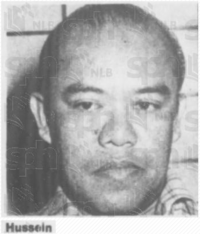hussein_jahidin
Jadual Kandungan
Hussein Jahidin (1932-2014)
Dirujuk oleh
Riwayat Hidup
- 1932: Dilahirkan.
- 1956 (8 Julai): Menubuhkan Perkumpulan Seni (||): “On 8 July 1956, Bani and a few friends, including reporter and playwright Hussein Jahidin, composer Zubir Said and poet Usman Awang, founded Perkumpulan Seni, which would become one of the three prominent Malay theatre groups of the period, together with Persatuan Persuratan Pemuda Pemudi Melayu (4PM) and Sriwana.” (TributeSG, 12 Oct 2016: |"BANI BUANG: The father of modern Malay drama in Singapore").
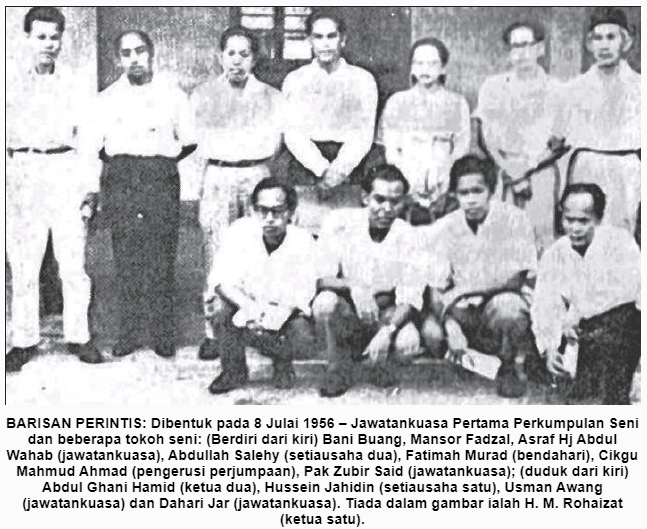
Perintis Perkumpulan Seni, 8 Julai 1956. (Sumber: Berita Harian Singapura, 19 Oktober 2020: ||"PS dirintis tokoh bukan calang-calang").
- 1960-an: Menyumbang kepada perkembangan drama Melayu Singapura: “Antara tokoh yang telah menyumbang kepada perkembangan drama Melayu Singapura pada 1960-an ialah Rawan Hiba atau Rahman B, Kalam Hamidi, Onn Abdul Rahman, Nongchik Abdol Gani, Hussein Jahidin, Yusnor Ef dan Shaharom Husain dan lain-lain lagi.” (Majlis Bahasa Melayu Singapura (MBMS), 2015: |"Yang Terukir - Bahasa dan Persuratan Melayu", m.s. 99)
- 1961: Pemberita Utusan Melayu, juga Ketua Parti Rakyat Singapura. Mengetuai mogok pekerja-pekerja Utusan di Singapura selama tiga bulan. (Isham Rais, 2014: |"Hussien, bekas pejuang Utusan Melayu meninggal dunia").
- 1962: Pegawai Kesatuan Sekerja
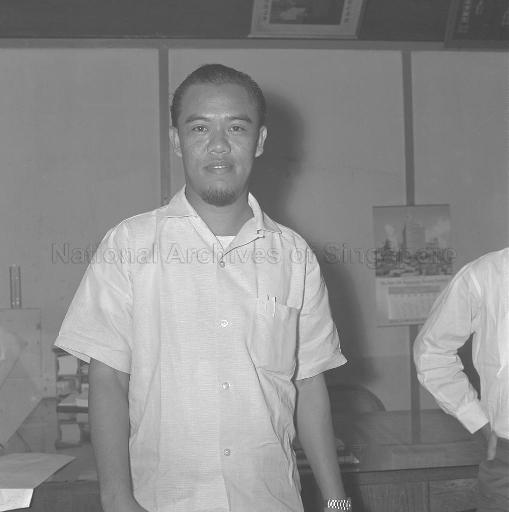
Hussein Jahidin, ketika menjadi pegawai kesatuan sekerja, 1962. (Sumber: SINGAPORE PRESS HOLDINGS (SPH), 8/1/1962: "MR HUSSEIN JAHIDIN, UNION OFFICIAL.").
- 1963: Pengerusi Jawatankuasa Kerja Kesatuan Sekerja Singapura / Singapore Trade Union Working Commitee, Ahli Jawatankuasa Kesatuan Wartawan Singapura, Ketua Seksyen Melayu Kesatuan Kakitangan Umum Singapura, serta pengarang “Suara Kesatuan”.
- 1963 (Feb): Tahanan ISA (kali pertama). Ditangkap bersama 120 orang lagi ahli parti kiri dan kesatuan buruh dalam “Operation Cold Store”: “The Barisan Sosialis was a feared adversary with strong left-wing support; but many of its top and capable leaders were neatly arrested and detained in the infamous 1963 security operation Cold Store, With the tacit support Of the British and the Malayan governments. The security operation netted in about 120 “troublesome and undesirable” persons, amongst whom were nine journalists from the Chinese-, Malay- and English-language print media. Notable among them were Said Zahari, Hussein Jahidin and Lee's future press amanuensis, James Fu Chiao Sian, each of whom we shall discuss in the course of this narrative. All the nine newsmen were detained not so much for their journalistic writings as for their trade union activities and known sympathies for the Barisan Sosialis and its leaders. All those 120-odd persons were tied by a common strand in their opposition to merger with Malaya. For example, Hussein Jahidin - as the then chairman of the Singapore Trades Union Working Committee - had invited representatives from more than a hundred civic organizations to oppose the referendum on merger. Two such proposed meetings were banned by the government.” (Francis T. Seow, 1998: "The Media Enthralled: Singapore Revisited, Volume 10", m.s.23).
- 1965 (21 Mei): Pembebasan bersyarat dari tahanan ISA. (Berita Harian, 21 May 1965, Page 1: |"HUSSAIN JAHIDIN BEBAS DARI TAHANAN").
- 1971: Yang Dipertua Perkumpulan Seni. Pernah menyampaikan pandangan kontra di dalam suatu forum di National University of Singapore (NUS) bertemakan “Adapting the Malays to urbanization and industrialization”: “This seminar was largely another occasion to parade the set of conducts of “Change Attitudes”- although with one interesting exception, the speech of Hussein Jahidin. Sidek Saniff exemplified the usual set of conducts by detecting a problem in the attitude of Malay organisations. He claimed that they chose the wrong field of activity, by focusing too exclusively on cultural issues. He urged them to be active not only in the cultural issues but also in social, economic, and educational fields, to enable Malays to develop effectively. However, the journalist Hussein Jahidin expressed a view that contrasted with the familiar pattern of “Change Attitudes”. He emphasised the achievements already made by the Malays up to that point, and asked why it is that Malays cannot acknowledge such changes. “It was suggested to Malays that they move from Kampong [urban slum] houses into HDB flats. This proposal has been carried out, and the majority of the Malays now live in HDB flats. Then the Malays were advised to work in industrial sectors. It cannot be denied that many Malays now do work in the industrial sectors . . . It seems to be untrue that the Malays have not changed their attitudes and that they have not managed to adapt themselves [to the current situation in Singapore]. What has yet to be attained by the Malay society is that degree of change desired by intellectuals and those others who are making appeals, urges, and suggestions.” This comment is significant and insightful. It precisely points out that “Change Attitudes” involves lack of appreciation for how much Malays have achieved. Housing and employment for Malays were both targeted as problems in the goals set by the landmark seminar in 1970. And in both areas, the Malays were already progressing well towards those declared goals. But no matter what is achieved by the Malays, it is never considered satisfactory because Malay academics and other leaders set the standard, and they simply keep urging the Malays to match the achievements of the other ethnic groups. After criticising the 'ivory tower' approach of intellectuals who were setting the “Change Attitudes” agenda, Hussien Jahidin added, “Let us suggest a different way”. His proposal was for Malay academics and other leaders to “meet face to face with [ordinary] Malays and together seek solutions to the problems they face.” (Yasuko Hassall Kobayashi, May 2006: |"Desire Bound: formation of a Malay minority agency in Singapore", m.s. 117-118).
- 1974: Lawatan ke Moscow, Russia.
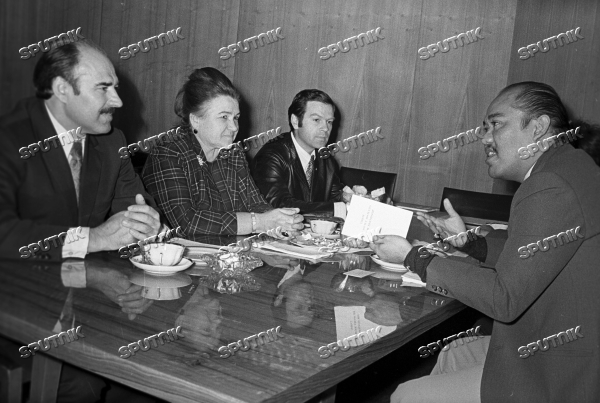
“The House of Friendship with Peoples of Foreign Countries. Member of the presidium and council of the union of Soviet societies of friendship and cultural relations with the foreign countries Valentina Lyubomudrova during a meeting with Hussein Jahidin, a guest from Singapore.” (S. Avramenko @ Sputnik, 1/6/1974: "Photo #2909111").
- 1976: Editor Berita Harian.
- 1981-1986: Pengelola penerbitan “Anika”, tabloid dwimingguan dalam Bahasa Melayu di Singapura. (Mohd Raman Daud @ Sekata - Jurnal Bahasa dan Persuratan, 6 Nov 2019, m.s. 9: |MENYUSURI KEWARTAWANAN MELAYU DI SINGAPURA). ”… akhbar tabloid dwi-mingguan yang diasuh Hussein Jahidin (1933-2014) yang muncul pada akhir 1980 dan terhenti penerbitannya kerana masalah kewangan pada 1986. Anika mempunyai ruangan berita setempat, lidah pengarang, sajak dan cerpen serta esei sastera, hiburan dan kisah luar biasa seperti cerita seram. Anika pernah mencapai edaran 22,000 naskhah pada 1983 dan kemudian muncul sebagai mingguan (A Ghani Hamid & Sulaiman Jeem 1997).“ (Majlis Bahasa Melayu Singapura (MBMS), 2015: |"Yang Terukir - Bahasa dan Persuratan Melayu", m.s. 188-189).
- 1982: Yang Dipertua Persatuan Wartawan Melayu Singapura.
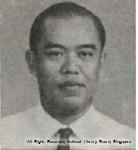
(Sumber: Persatuan Wartawan Melayu Singapura, 1982: Wartawan: majlis ulangtahun ke 27, m.s. 2)
- 2014 (1 Feb): Meninggal dunia (Usia 81 tahun), setelah lebih 10 hari sakit tenat di Hospital Besar Singapura (SGH), kerana mengalami penyakit ginjal, kencing manis kronik, tekanan darah terlalu rendah dan masalah jantung.
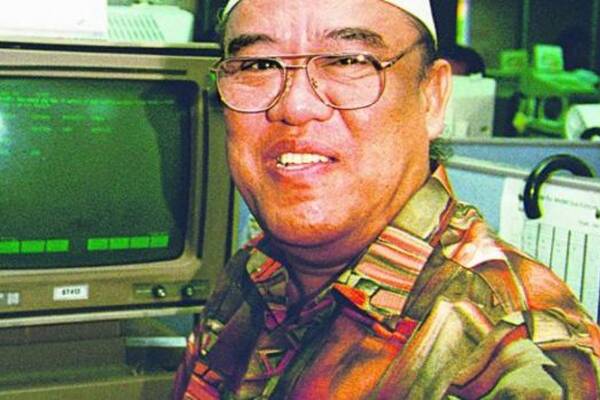
Hussein Jahidin (Sumber berita dan gambar: Irma Kamaruddin @ Berita Harian Singapura, 2/2/2014: |"Mantan editor BH meninggal dunia").
Pengakuan penting: Kami bukan ahli sejarah! Sila klik di sini untuk penjelasan lanjut.
hussein_jahidin.txt · Last modified: by sazli

